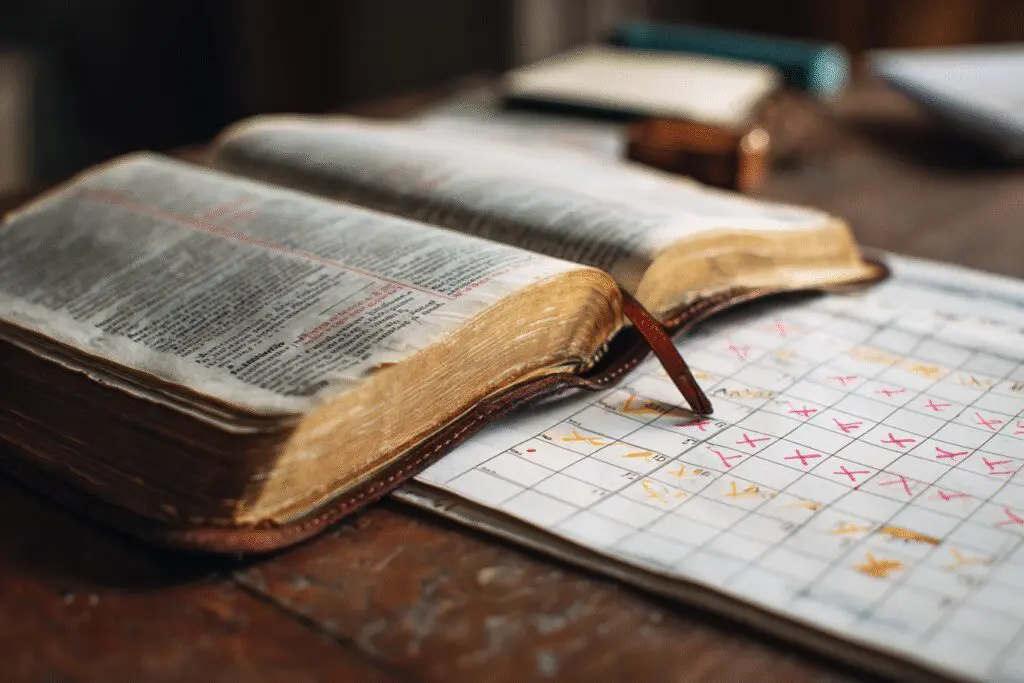I remember the first time I really looked at my Bible. Not just as something to bring to church, but as a book. It was sitting on my nightstand, thick and imposing, with its whisper-thin pages. A thought hit me, and maybe you’ve had it too: “Could I actually read this entire thing, from Genesis to Revelation?” It felt like deciding to climb a mountain without knowing how tall it was.So, let’s get right to it. How long would it take to read the whole Bible?
For the average reader, it takes between 70 and 100 hours to read the Bible from cover to cover.
There you have it. That’s the straightforward answer. It’s not an impossible, lifelong quest. It’s a goal that’s more achievable than you might think. But that number, 70 to 100 hours, is just the beginning of the story. The real journey isn’t about the clock; it’s about the transformation that happens along the way.
The time it takes is less important than the time you spend with God in the process. It’s a conversation, not a race.
More in Bible Category
Is the Word Rapture in the Bible
How Can I Be Saved Bible Verse
Key Takeaways for Your Reading Journey
For those who like to see the main points upfront, here’s what we’re going to explore. This is the stuff that really matters when you’re thinking about starting this amazing journey.
- It’s Achievable: Reading the whole Bible takes roughly 75 hours on average, which breaks down to just 12-15 minutes a day to finish in one year.
- Your Pace Matters: Your personal reading speed and style (are you studying or just reading?) will change your timeline significantly.
- Translation Makes a Difference: The version of the Bible you read can affect the time it takes. Some translations use more modern, simpler language, making for a quicker read.
- It’s Not a Race: The true goal isn’t to just finish, but to connect with God’s Word. Getting bogged down in certain sections is normal and perfectly okay.
- A Plan is Your Best Friend: Whether it’s a 90-day challenge or a year-long plan, having a structure helps you stay on track and turn a big goal into small, daily steps.
Breaking Down the Bible by the Clock
Thinking about the Bible in “hours” can feel a little strange. We don’t usually measure spiritual books with a stopwatch. However, understanding the time commitment can actually make the goal feel much more real and manageable. It takes the “impossible” feeling out of it and replaces it with a practical plan.
How Many Hours for the Old Testament?
The Old Testament is the larger portion of the Bible by far. It’s where you find the creation story, the history of Israel, the poetry of the Psalms, and the wisdom of Proverbs.
- Approximate Word Count: Around 600,000 words.
- Estimated Reading Time: Between 50 and 70 hours for the average person.
That’s a big chunk of time! This is where most people get intimidated, and I get it. I’ve been there. You start strong in Genesis, power through Exodus, and then you hit Leviticus with all its laws and details, and your pace just grinds to a halt. It’s completely normal.
How Many Hours for the New Testament?
The New Testament is much shorter and focuses on the life of Jesus and the growth of the early church. For many, its narrative style feels more familiar and can be a quicker read.
- Approximate Word Count: Around 180,000 words.
- Estimated Reading Time: Between 15 and 20 hours.
When you look at it this way, reading the entire New Testament is about as time-consuming as reading a couple of modern novels. You could easily do it in a month of daily reading without feeling rushed.
What Factors Change How Long It Takes to Read the Bible?
The 70-100 hour estimate is a great starting point, but it’s not a one-size-fits-all number. Your personal journey through the Scriptures will be unique, and several things can affect your pace.
What Is Your Personal Reading Speed?
We all read at different speeds. Some people can fly through pages, while others, like me, prefer to take it a bit slower to let the words sink in. There’s no “right” speed. The average American reads about 200-250 words per minute. If you’re a slower reader, you might be closer to 150 words per minute, which would put your total time closer to the 90 or 100-hour mark.
And that is absolutely fine. God isn’t tapping His foot, waiting for you to hurry up. He meets you at your own pace.
Are You Reading for Information or Transformation?
This might be the biggest factor of all. Why are you opening the Bible today?
- Reading for the Story: If you’re reading to get the overarching narrative of God’s relationship with His people, you’ll likely read much faster. You’re following the plot, the characters, and the grand story of redemption.
- Reading for Deep Study: If you’re studying a passage, you might read a single verse and then pause for ten minutes to pray and think about it. You might have a commentary open next to you or a journal to write down your thoughts. This is a much slower, more deliberate process.
I’ve had days where I spent 30 minutes in the book of Psalms and only read a few verses because they spoke so directly to my heart. On other days, I’ve breezed through several chapters of 1 Samuel because I was so caught up in David’s story. Both are valid ways to engage with the Bible.
Which Bible Translation Are You Using?
The Bible wasn’t originally written in English, and the translation you choose can have a big impact on your reading experience. Translators work to balance being faithful to the original Hebrew and Greek with making the text understandable to a modern audience.
Some translations use more formal, traditional language (like the King James Version), which can be beautiful but might slow you down. Others use very contemporary language (like The Message or the New Living Translation), which can often be read more quickly. The New International Version (NIV) is somewhere in the middle and is one of the most popular because it strikes a good balance.
There is no single “best” translation; it’s about finding one that helps you connect with God. For a deeper dive into how different translations work, Dallas Theological Seminary has an excellent article that can help you understand the philosophies behind them. This can be a great resource for picking the right one for you.
How Can I Create a Practical Bible Reading Plan?
Okay, so we know the numbers. But how do we turn that knowledge into action? A plan is what turns a vague wish into a concrete goal. A marathon runner doesn’t just show up on race day; they follow a training plan. Reading the Bible is the same.
How Much Do I Need to Read Daily to Finish in a Year?
This is the most popular plan, and for good reason. It’s sustainable. Let’s do the math.
If we take our average of 75 hours and multiply it by 60 minutes, we get 4,500 minutes of reading. Divide that by 365 days in a year, and you get about 12.3 minutes per day.
Think about that. Just 12 minutes. That’s less time than you probably spend scrolling through social media or waiting for your coffee to brew. Anyone can find 12 minutes in their day. This makes the seemingly impossible goal feel incredibly possible.
What About a 90-Day Challenge?
Maybe you’re in a season of life where you want a more intense, immersive experience. A 90-day plan is a fantastic way to get a bird’s-eye view of the entire biblical story in a short amount of time.
Using our 4,500-minute total, if we divide that by 90 days, we get 50 minutes per day. This is a much bigger commitment. It’s nearly an hour every single day. But the reward is a deep dive into the Word that can be spiritually refreshing and incredibly insightful.
My Own Attempt at a Reading Plan (and What I Learned)
I have to be honest with you. The first time I tried a “read the Bible in a year” plan, I failed. I started strong on January 1st, full of motivation. By mid-February, I was already a few days behind. By March, I had given up.
What I learned was this: grace is more important than the schedule. I had turned it into a legalistic chore. If I missed a day, I felt guilty, and that guilt made me want to avoid my Bible altogether.
The next time I tried, I changed my mindset. My goal wasn’t to check a box every day. My goal was to connect with God through His Word. If I missed a day, it was okay. I’d just pick it up the next day. I stopped seeing it as a rigid schedule and started seeing it as a daily invitation. That change made all the difference.
Beyond the Clock: The True Purpose of Reading Scripture
It’s easy to get caught up in the numbers, the hours, and the reading plans. Those things are helpful tools, but they aren’t the main goal. We don’t read the Bible to earn points with God or to boast about our accomplishment.
We read the Bible to know God.
Why Isn’t This Just a Race to the Finish Line?
Reading the Bible is about a relationship. It’s one of the primary ways God speaks to us. It’s His story, His character, His promises, and His love for us laid out on the page. When you speed through it just to say you “finished,” you miss the chance to hear what He is trying to say to you personally.
It’s like having a conversation with a friend. You don’t rush them to finish their story just so you can say the conversation is over. You listen. You pause. You ask questions. You let their words sink in. That’s how we should approach God’s Word.
What Do I Do When I Get Stuck in the “Boring” Parts?
Let’s be real. There are parts of the Bible that are tough to get through. The lists of names, the detailed instructions for building the tabernacle, the long genealogies. It’s easy to feel your eyes glaze over.
When you hit those sections, here are a few things that have helped me:
- Remember the Context: These passages were incredibly important to their original audience. The genealogies showed that God keeps His promises through generations. The detailed laws showed that God cares about every part of our lives, not just the “spiritual” stuff.
- Look for Jesus: The New Testament tells us that all of Scripture points to Jesus. Try to ask, “What does this passage teach me about God’s character or His plan of redemption that is ultimately fulfilled in Christ?”
- Give Yourself Permission to Skim: It’s okay. If you’re on a plan to read for the overall story, you don’t have to meditate deeply on every single name in the book of Numbers. You can read it to understand the context and then move on.
How Can Prayer Completely Change My Reading Time?
This is the secret ingredient. Before I open my Bible, I try to always start with a simple prayer: “Lord, open my eyes to see what you want to show me. Help me to understand your Word and let it change my heart.”
Prayer turns reading from an academic exercise into a spiritual encounter. It invites the Holy Spirit, the author of the book, to be your teacher. It shifts your focus from “getting through the reading” to “meeting with God.”
So, as you think about the hours it might take to read the Bible, I want to encourage you. Don’t let that number intimidate you. See it as an invitation. An invitation to spend 70, 80, or 100 hours getting to know the God who created you and loves you more than you can possibly imagine.
It’s a journey worth every single minute.
Frequently Asked Questions – How Long Would It Take to Read the Whole Bible

What are the spiritual benefits of reading the Bible regularly?
Regular Bible reading strengthens faith, deepens understanding of God’s character, and reveals Christ throughout Scripture. It encourages spiritual growth, provides comfort, guides decisions, and helps you grow closer to God, transforming your heart and renewing your mind.
How does choosing different Bible reading plans affect the overall time?
Different reading plans can influence how quickly you complete the Bible. Straight-through plans might take a year, while more intensive plans like a 90-day read require about 45 to 50 minutes daily. The choice depends on your schedule and spiritual goals.
What is a practical daily timeframe to read the Bible in one year?
To read the Bible in one year, you should aim to spend about 12 to 15 minutes each day reading. This small daily commitment allows you to gradually progress through the scriptures while maintaining time for reflection and prayer.
How long does it typically take to read the whole Bible?
On average, it takes about 75 hours for a normal reader to read the entire Bible, depending on their reading speed. This can be broken down into daily reading goals, making it a manageable and enriching spiritual practice.
Why is reading the entire Bible important for a Christian?
Reading the entire Bible is important because it reveals God’s full character, His love, mercy, justice, and plan for salvation. It helps believers build a deeper relationship with God, understand His will, and see how His promises unfold throughout the scriptures.


